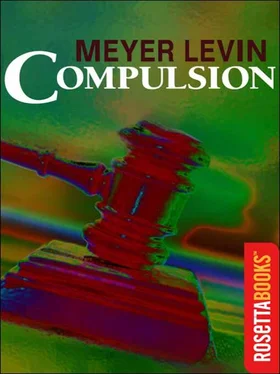What could you get, then, for kidnapping alone? Judd was shading in the initials on the cross, class was ending, and he managed to walk out alongside the instructor.
It wasn’t difficult to steer the conversation to the Kessler crime, as a striking current example of a compound crime. Suppose the criminal were apprehended, Judd asked, in preparing a defence would it not be advantageous to let him stand for the kidnapping instead of the murder?
Well, in some states, yes, that would be a distinct advantage, the instructor said. But in Illinois, kidnapping had quite recently been made a capital offence – since that miserable case of the abducted little girl assaulted in the coal cellar, the Fitzgerald case. “And in this crime,” said the instructor, “if they ever catch the perpetrators, I’m afraid the best legal manipulation would be of no avail. There are times when law seems pointless – any verdict short of hanging would be corrected by a lynch mob, I imagine.” He flashed an academic smile that had in it a touch of their shared superiority to the mob.
After his next class he met Artie. They strolled across the Midway, Artie hooting about the latest stupidities of the cops – checking every Winton in town. They even had the car wrong! And the two tramps and the vagabond woman who had been caught with a busted typewriter – now that was something! And that reminded him. “How’d you make out last night, Jocko? Did you get in?”
“Oh,” said Judd, “it wasn’t that kind of a date.”
Artie horse-laughed. She’d been running around with a frat brother of his, and Sid was no chump – Sid was a newspaperman. Hell, when they had all been together on Friday, hadn’t Judd been able to see that the girl was Sid’s push? Did he think a newspaperman would be wasting time with a girl that didn’t come across? Artie was willing to bet a ten-spot he could lay Ruth on his first date.
Judd was silent.
When he reached home, Aunt Bertha was already there, busily directing Emil in hanging summer curtains and draperies. It should have been done long ago! No woman in the house! And suddenly Aunt Bertha fixed her eyes on Judd, coming up to him and touching his sleeve. “And how are things with you, Judd? You’re looking worried. What can a boy like you have to worry about? He passes his Harvard exam with flying colours. And in a week he’s running off to sow his wild oats in Europe, and he’s worried!”
He smiled. She contracted her brows. “Maybe you are in love?”
“Maybe I am,” he said, to give Aunt Bertha some excitement.
“You just hate to have Max do something you can’t do,” she remarked, pleased at her shrewdness. And with a sigh: “If only your mother had lived for this. You see, Judd, it’s the same way with sisters, too. They’re jealous of each other and still they love each other.”
He kept the smile fixed on his face. Jealous of Max the Mope! “I was jealous of your mother when she married first,” his aunt said. Then, with a streak of asperity she added, “You know something? I was almost jealous of her for passing away first and being done with it all?”
It was this, this cheerfully admitted pessimism, that made him every once in a while feel you could talk to Aunt Bertha. She might even understand the whole thing with Artie; if any of them could get a glimmer of it. Aunt Bertha would be the one. No she would put the blame on Artie, as his mother would have done. Just as they had blamed others every time he got a childhood disease.
Judd remembered suddenly the one year when he had gone to public school, and his mother had admonished him, “Don’t ever touch anything. You’ll get germs. Don’t sit on the toilets. You must absolutely wait until you get home, Judd dear, you understand? They’re just common children.” And it had indeed scared him, because being sick all the times with hives and boils and eruptions on his skin, he was in horror of more hurting and more ugliness of oozing and scabs. Judd recalled how he had felt all that time, with the kids jeering, but keeping their distance. And in the corridors of the school, he had always tried to walk so as not to touch or be touched, until it seemed there had always been a space around him, everyone leaving him alone. Until that one day…
“What is it? Something bothering you?” his aunt appealed.
“You know, I may not be going to Europe,” Judd remarked. For an instant he was going to add, “I might get caught.” But instead he let the story of his love affair come out, saying he was quite interested in a new girl and might not care to leave just now.
“A new girl! And you’d give up your trip for her! Well, that’s really serious! Tell me! Who is she?”
Someone she wouldn’t know, he said. Just a girl.
Not a shikseh ! Even with her supposedly liberal philosophy, there was this automatic horror. But Aunt Bertha covered it at once, giving him her lecture about how of course if he were truly in love with a nice gentile girl of good family, it would be no tragedy – there had been some good intermarriages on the South Side. Look at Artie’s mother, a Catholic. But still it was always luckier if you happened to fall in love with someone from your own background – like Max going to New York and meeting a wonderful girl at his brother’s, a Mannheimer, too! But suddenly she halted, eyeing him with new apprehension. It wasn’t some little tramp like that one he nearly got into trouble with last year, a pickup?
Judd shook his head. “This is serious, I assure you.”
Then he told her about Ruth, a brilliant student. Her family were respectable little people; her father owned a drugstore.
“Russian Jews, I’ll bet,” she said with a sigh. Still, there could be worse tragedies. “But you’re so young, Judd, a brilliant boy. Your father would be disappointed if-”
Then his aunt observed that perhaps the trip would really be the best thing. If he found himself still interested in the girl when he returned, and if she would wait until he got through Harvard Law School -
Wait . The word instantly brought an image; he was coming out of prison, his hair white at the temples, and Ruth was waiting at the gate, her dear face softened with years of faithfulness. Then a gush of grief came up in Judd, almost breaking out as tears, and at the same time he chided himself in disgust for this cheap sentimentality.
With her eyes still on his face, his aunt had caught the passing emotion. “It’ll be all right, Judd. It’s youth, youth. We all have to go through it,” and she patted his hand.
At dinner everything centred on Max. All the arrangements were reviewed again, to the last detail, for the arrival of his girl and for the engagement party. Uncle Adolph permitted himself some smutty jokes about Max’s impatience, with advice about what to do during the engagement period – “put it in the icebox” – and even the old man laughed indulgently. Max carried it all off with a large air of tolerance.
There was talk of honeymoon plans. “Kid, we might even meet you in Italy.” And Judd was squirming more and more at this smugness, while at the same time a choking self-pity was in him. “Never for me, never anything so ordinary and simple as happiness.” Then he took an inward vow – if he weren’t caught, if he got away with the thing, it would be a sign, an omen for him to marry Ruth and be conventional all his life.
They were sitting down for a little family game after dinner, and he even felt a kind of dopey pleasure in the ritual, perhaps for the last time. Then Artie burst in, waving his long arms, “Jocko, you’ve got to see this! They’re tearing up the whole street where Steger lives! The sewer is stuffed up! They think he shoved the clothes down there.”
Читать дальше












